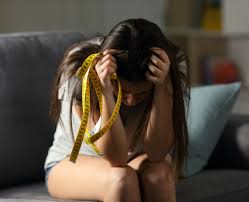Take a moment and look at yourself in the mirror. What do you notice about yourself? How do you feel when you look at yourself? What thoughts come to your mind as you observe your appearance and how you move?
Perhaps while performing this exercise, you viewed yourself with neutrality or even positivity. For many people, however, this sort of exercise may create the opportunity for individuals to focus on what they do not like about their appearance. Although it is part of human nature to identify “problems” so that we can fix them, sometimes these “problems” are blown out of proportion and cause us distress. So what is body image and why is it important?

Body image is how we perceive our bodies and how we assume others see us as well. Perhaps you have met someone you considered to be attractive and were shocked to hear that they do not see themselves the same way, maybe even describing themselves as unattractive. This person may have poor body image which makes it very difficult for them to believe they could be perceived differently from how they view themself.
Body image issues stem from many sources, including family, friends, social pressure, and the media. We are constantly being bombarded with what is “attractive” and what is not. When we start to believe the messages that are being conveyed to us, we may find ourselves beginning to struggle mentally with our appearance. Individuals with body image issues are at a higher risk for mood disorders, self-harm behaviors, and relationship problems. Eating disorders are commonly associated with body image issues and are very dangerous if left untreated.
A common misconception is that only women struggle with body image issues. While body image issues are mostly reported by women, men can, and often do, struggle with this battle as well. While women may tend to focus on weight, men will typically focus on muscularity, which is tied to what they perceive as being “masculine”. Men with body image issues may resort to abusing anabolic steroids to build muscle and struggle with lower self-esteem, confidence, and life satisfaction, in addition to the risks mentioned above.

If you or someone you know struggles with body image issues, there is help available. In therapy, a licensed clinician may use Cognitive Behavioral Therapy (CBT) to help restructure maladaptive thinking and behavioral patterns that contribute to poor body image. In addition, receiving education related to social media and how diverse human bodies actually are can help us to peel back the lens that has masked reality. Through understanding the misinformation being spread through social media, we can achieve a healthier relationship with our own appearance.
Our bodies are our own to love and take care of. Through practicing self-love and building self-esteem, we can overcome body image issues and enjoy the life we are living today. We do not need to embrace the lie that we can only enjoy ourselves once we look a certain way. In closing, I would like to leave you with this quote from Jessica Ortner.:
“You can’t hate yourself happy. You can’t criticize yourself thin. You can’t shame yourself worthy. Real change begins with self-love and self-care.”
Sources:
https://withinhealth.com/learn/articles/the-effects-of-negative-body-image
https://www.dosomething.org/us/facts/11-facts-about-body-image